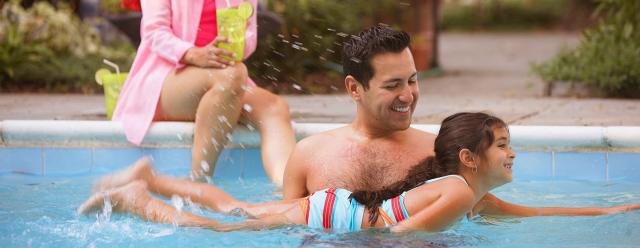Hands-Only CPR Can Save the Life of Someone in Cardiac Arrest
Why It Matters:
- Simple steps can prevent accidents and illnesses and keep summer fun, safe, and healthy.
- COVID-19 is still around, so watch for symptoms and test when necessary to help stop the spread this season.
- Even without formal training, you can perform Hands-Only CPR — and save a life.
After two years of the COVID-19 pandemic, it’s the summer we have anxiously awaited to get together with friends and family or travel.
But when socializing this season, be mindful of potential health and safety hazards. A few common-sense precautions amid the fun may prevent a trip to the emergency room or save someone’s life.
“This year, we are seeing a lot more people getting out and about doing things,” said Dr. Comilla Sasson, American Heart Association vice president for emergency cardiovascular care science and innovation.
In her emergency department work in Colorado, Sasson and fellow doctors are seeing more cases that typically occur in summer, including heat illnesses, water accidents, and fireworks mishaps.
Beat the heat
Plan outdoor activities for cooler parts of the day to prevent heat illnesses. Some, such as heat cramps and heat rash, are mild and can be treated by simply getting out of the sun and getting hydrated.1
“Heat exhaustion is characterized by profuse sweating, which is a natural cooling mechanism, and possibly nausea or a headache. The body temperature rises to around 100 degrees,” Sasson said. If this happens, find a cool, shady spot as soon as possible.
“Heat stroke is more serious. The body’s internal cooling system starts to fail, and the core body temperature may reach 104 to 108 degrees,” Sasson said. Sweating stops, a person’s skin becomes hot and dry, their heart may beat fast, and they may lose consciousness. It’s important to call 911 to get emergency help right away. Heat stroke can lead to death.1
The United States could lose about $100 billion a year in productivity due to heat-related problems, and it’s predicted that this number could double by 2030.2
Dehydration contributes to heat illness. Alcohol and caffeine, certain medications, or being overweight and physically over-exerting can cause you to become dehydrated. So drink plenty of water or other non-alcoholic fluids to stay hydrated.
Use sunscreen with SPF of 30 or greater and wear protective clothing and hats, even on cloudy days, to protect against sunburn. Severe sunburn can cause skin pain, swelling, and blisters. Treat sunburn with pain relievers and by cooling the skin. Seek immediate medical care if you’re sunburned and have a fever over 103 degrees, confusion, dizziness, or faintness.3
Watch out on the water
Drowning is a leading killer of children. More children ages 1 to 4 die from drowning than any other cause except birth defects.4 Many people overestimate their child’s ability to swim, so pay attention to swimming capabilities.
“That heightened awareness is really important,” said Sasson, who is also a clinical associate professor at the University of Colorado.
A child who can swim might still drown. That’s also true for teenagers and adults who get tired or cramps while swimming. Keep children safe by ensuring fences are around pools and using U.S. Coast Guard-certified life vests when boating.
Make sure your child’s babysitter knows what to do in case of drowning, which can happen quickly and quietly. Close supervision is vital when children are swimming. Caregivers should avoid distractions and know CPR and how to get emergency help. Keep life preservers poolside, and if a child is missing, look for them in the pool or hot tub first.5
Boating and rafting injuries and deaths also increase during the summer, so practice safety at lakes, rivers, and oceans. Coastal drownings in the U.S. account for about $273 million in direct and indirect costs each year.6 “Avoid getting out on the water if you’ve been drinking alcohol or are under the influence of drugs,” Sasson said.
Perform CPR and save a life
If someone is unconscious or non-responsive, they may have suffered cardiac arrest, which means their heart stopped. Call 911 immediately and begin Hands-Only CPR. “Even if you don’t have CPR training, you can still perform the procedure and possibly save a life,” Sasson said.
Hands-Only CPR doesn’t require mouth-to-mouth breathing. Place your clasped hands in the center of the chest and press hard and fast, two inches down, about 100 to 120 beats per minute. One way to think about the pace is to use the rhythm of the Bee Gees song “Stayin’ Alive.”7
Don’t hesitate or worry that it’s inappropriate or unnecessary. If the person suffered cardiac arrest, you’ll be helping the heart do its job until medics arrive.
“You’re acting like an external heart,” Sasson said. “You can be buying somebody time.”
Every minute without CPR after cardiac arrest decreases a person’s chance of survival. By 10 minutes, death is likely. If an automated external defibrillator is available nearby, use the lifesaving device.8
CPR can also save the lives of many people who overdose on opioids. You can also carry and use naloxone, a medicine that rapidly reverses an opioid overdose.9
Wear a helmet, protect your brain
Injuries from crashes on bikes and scooters tend to pick up in summer because of the increase in outdoor activities.
Wearing a helmet provides protection. As an ER doctor, Sasson said, she has seen “horrible, horrible traumatic brain injuries” resulting from bike and scooter wrecks.
“Alcohol-related falls and accidents also increase during the warm weather party season,” she said. Alcohol impairs judgment and increases risk-taking.10
Be aware of COVID-19 risks — and crowds
COVID-19 is sticking around, and cases have surged this summer. “Some people who became ill with the Omicron variant last winter are getting reinfected as the virus continues to mutate,” Sasson said. Most people don’t get as sick with the latest variants, but COVID-19 can still send someone to the hospital.
If you have symptoms, stay home and don’t travel or attend public events. Sasson recommends doing at-home rapid testing multiple times if symptoms show up; one negative test might not be enough.
Keep windows open and fresh air circulating at gatherings. When visiting with someone who is immunocompromised, wear a mask for their safety. It’s also wise to mask up on trains, buses, and planes.
A few simple precautions can keep summer activities safe — and we can all enjoy the season.
Things to Consider:
- Plan outdoor activities for cooler parts of the day and stay hydrated to beat the summer heat.
- Recognize your children’s swimming abilities, realizing that even youngsters who know how to swim can drown.
- Avoid overindulging in alcohol or using drugs when out on lakes, rivers, and the ocean to keep boating and other water sports safe.
1 "Heat Illnesses," Centers for Disease Control and Prevention, December 2021
2 "The Many Costs of Neglecting Your Heat Safety Plan," Occupational Health & Safety, March 2022
3 "Sunburn," Mayo Clinic, July 2021
4 "Drowning Facts," Centers for Disease Control and Prevention, March 2022
5 "Pool Dangers and Drowning Prevention―When It’s Not Swimming Time," American Academy of Pediatrics, July, 2020
6 "Drowning," World Health Organization, April 2021
7 "Learn Hands-Only CPR in 60 Seconds," American Heart Association, Go Red for Women, 2022
8 "How Long Does Brain Activity Last After Cardiac Arrest?" Verywell Health, January 2022
9 "Naloxone Drug Facts," National Institute on Drug Abuse, January 2022
10 "Risky Drinking Can Put a Chill on Your Summer Fun," National Institute on Alcohol Abuse and Alcoholism, May 2022
This article was prepared by the American Heart Association (AHA). Transamerica is not affiliated with the AHA and does not control, guarantee, or endorse the information. This information does not constitute the practice of medical advice, diagnosis, or treatment. Always talk to your healthcare provider for diagnosis and treatment, including your specific medical needs. If you have or suspect that you have a medical problem or condition, please contact a qualified healthcare professional immediately. If you are in the United States and experiencing a medical emergency, call 911, or call for emergency medical help immediately.
Transamerica Resources, Inc. is an Aegon company and is affiliated with various companies which include, but are not limited to, insurance companies and broker dealers. Transamerica Resources, Inc. does not offer insurance products or securities. The information provided is for educational purposes only and should not be construed as insurance, securities, ERISA, tax, investment, legal, medical or financial advice or guidance. Please consult your personal independent professionals for answers to your specific questions.



